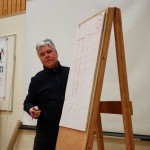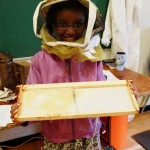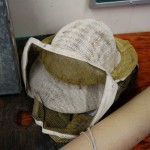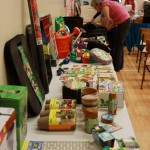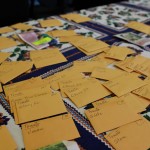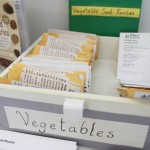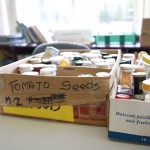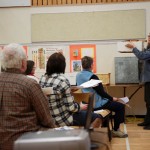by LAURA KEIL
Kelly Mortensen is what you might call a farming pioneer. His crop? Some of the most northern wine grapes in the world.
He was one of the presenters at the annual Seedy Saturday March 5th. Over 60 people descended on the Dunster Fine Arts School to learn about seeds, plants and growing.
Mortensen and other local presenters like beekeeper Monica Zieper emphasized a simple truth: just because the Robson Valley isn’t an ideal climate, doesn’t mean you won’t find success.
Mortensen first planted his wine grapes 10 years ago, after reading an article about how climate change will affect vineyards. Of the 1000 plants he started with, only 150 have survived. Through trial and error, study and good luck, his surviving plants are now producing sweet wine grapes.
“There’s no rules,” he says, noting that many of the guidelines that work in the south, don’t apply in this climate.
He was informed by a vintner that there isn’t enough sun during a season for his grapes to mature. He shrugged. His grapes were growing.
His technique includes orienting his rows east-west to pick up more southern light; his property is sloped helping with both sunlight and drainage; he has perfected pruning and lets grass grow along the rows for winter cover starting in August.
He’s found that under the clay layer is a sand layer that remains cool in the summer and warm in the winter. He figures the plants that are surviving have plunged their roots into this layer.
Now that he has found grape varieties and a growing system that works, Mortensen will fill five acres on his McBride property with his successful grapes. What variety are they? That’s a trade secret.
He is still years away from bottling his first batch, but already he has been approached by a wine seller saying the company
will buy anything he produces regardless of quality, due to its northern caché.
Monica Zieper is not troubled by the short growing season either. But the beekeeping season is also short, she told the packed gym March 5th.
“This is not lotus land. It’s not the lower mainland, it’s not Oregon.”
Zieper has hosted a number of workshops recently about beekeeping. The first meeting had over 30 people. The following meetings had over 20. Many of those people have ordered beekeeping supplies.
It costs $668 for beekeeping start-up costs, she says. The first year you won’t get much honey – the bees have to work hard to produce enough just to last through the winter. But after that, a beekeeper can harvest 40-60lbs of honey per box each season.
Zieper says there are only three reasons bees die in winter: they starve, die of disease or freeze.
She says it’s important not to steal too much honey from the hive or the bees will starve.
After the presentation, people were invited to check out the beekeeping materials Zieper had brought. Also on display were
gardening materials, books, and of course, seeds.
Vern Pawloske spoke about his family farm and bringing vegetables to market. Another presentation outlined the new seed library at the McBride and District Public Library where patrons can take seeds, plant them, and then return new seeds the following year.



